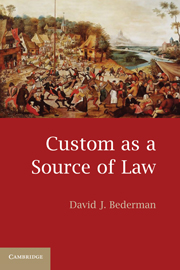8 - Torts
Published online by Cambridge University Press: 05 June 2012
Summary
Torts are definitionally nonconsensual civil wrongs. Because there is no consent, the actors in a tort or delict – victim and perpetrator – usually have no shared community relationship. So, unlike any of the legal realms in which custom figures prominently (and which have been considered so far in this part), the law of torts and negligence is typically one where common community values do not count. In the drama that is each instance of a delictual wrong, the players are usually strangers to one another. But does that necessarily mean that they should be estranged from the communities of expectations and norms that each may individually embrace?
In the continuum of private-public law relations and disputes, torts (like criminal law, with which it is always compared) has strong public law overtones. Custom, as a consequence, is often viewed skeptically as a source of legal norms in tort. Yet, ironically enough, it is in the law of negligence or fault that custom-based standards of care find their greatest fulfillment in the law. We take it as an article of faith that community standards establish the relevant duties of care, whether we employ one English judge’s quaint idiom of the “man on the Clapham omnibus,” or simply the “reasonable person.” As one court elegantly put the matter, the customary manner of doing something “would presumably represent the standard of ordinary prudent” people.
- Type
- Chapter
- Information
- Custom as a Source of Law , pp. 91 - 100Publisher: Cambridge University PressPrint publication year: 2010



